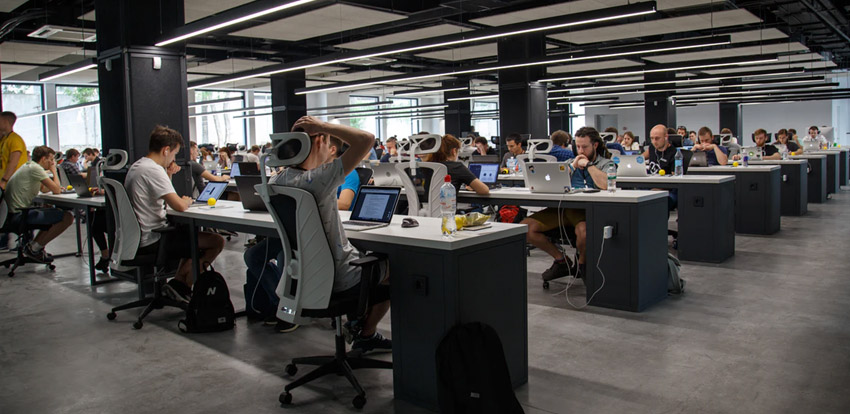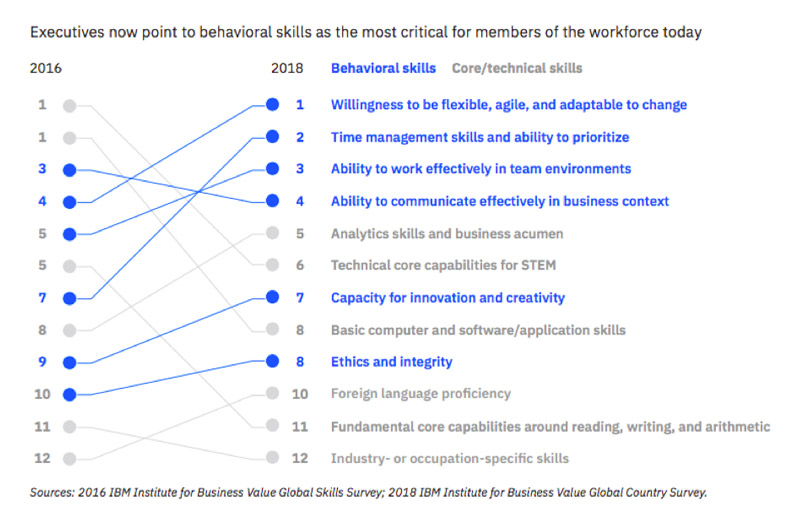
With AI, automation and other developments linked to the fourth industrial revolution on the rise, that the way work is done worldwide is changing – and rapidly.
These changes have brought with them waves of uncertainty (alarm, even) about the future of work, but many are realizing that they’ve also introduced new and emerging opportunities that will open up the door to a realm of modern possibilities.
Organizations that want to ready themselves and their employees for future demands and possibilities need to ensure that their employee training programs are equipping people with the necessary skills.
According to a study presented by IBM, over 120 million workers in the world’s 12 largest economies may need to be retrained or reskilled in the next three years.
“I expect AI to change 100 percent of jobs in the next five to ten years.”- Ginni Rometty, IBM Chairman, President, and CEO
While there seems to be an awareness of the current skills gap, IBM reports that most executives don’t believe their organization is prepared for the changes that lie ahead.
What skills are becoming most important?
For some time, there has been a high demand for digital, computing, and analytical skills, as well as for technical capabilities in mathematics and science. Interestingly, while digital skills remain essential, IBM’s research shows that behavioral and soft skills are now seen as most important.

With the changing face of the work world, employees are already expected to be highly adaptable, innovative and creative.
Given our always-on digital lifestyles and the influx of information coming at us every day, employees also need to be able to prioritize. Teams are spread out across the world and an increasing number of employees work remotely. This requires strong communication skills and the ability to work with a diverse group of people.
Further, managers have also had to adapt their approaches to fit the modern picture of work. If they weren’t before, they’ve had to start managing flexible and remote teams, and encouraging autonomy, innovation and agility.
How can you equip your organization and your people for the future?
It’s important to note that the time it takes to close a skills gap through traditional employee training is also changing. According to the aforementioned report, this time has increased by more than 10 times in the past four years. The median time it took to close a gap through employee training in 2014 was three days. This figure jumped to 36 days in 2018.
This means that organizations can’t delay in getting themselves and their employees equipped with the appropriate skills for the future.
You can support the process of adaptation through various employee training efforts:
Turn employee training into continuous learning
First and foremost, it is essential to embrace a culture of continuous learning at your organization. It’s an ongoing process – and by weaving learning and training into your organization’s DNA, you can eliminate the ‘scramble’ to get your employees ready for inevitable changes and developments. You’ll also avoid losing great people this way.
The inclination to learn and develop one’s skills should be encouraged among your employees. This can be supported with the help of technology and by following a few steps to encourage participation in corporate learning.
Use career mapping to identify skills development opportunities
To effectively invest in employee training and skills development, it’s important to understand which skills exactly individuals need to develop. This can be facilitated by helping employees plot out a career roadmap. Learn how here.
Everyone wants to know that their hard work will pay off in the end. A career roadmap, with associated milestones, is a powerful tool for motivating employees (as well as retaining them). Add regular and fair performance reviews, and real-time feedback, and you’ll encourage employees to be self-aware, focused on development, and motivated to master new skills.
Develop an internal gig economy
As we saw earlier, adaptability, creativity, innovation and the ability to work effectively in team environments, are all skills that are high in demand. A fantastic way of nurturing these qualities internally is by giving your employees the platform to put these skills into practice.
Smart companies are embracing the gig economy trend internally, realizing that it’s better to have their employees taking on extra projects within their organization than losing their employees’ creative input to other companies. Use a gig platform to encourage your employees to take on new projects, and work with teams across the organization – it’ll sharpen their skills and help you retain your top performers.
Foster connections through networking and mentorship
Another effective way of acquiring new skills is by learning from others. To boost the rate of learning at your organization and to ensure that skills gaps are being closed, encourage both networking and mentorship opportunities.
Interacting with clients, suppliers and other subject matter experts via networking boosts insight into the industry by keeping employees abreast of the latest developments, changes and opportunities for growth. Additionally, it is good for employees’ confidence, helping them polish soft skills like business communication and the ability to interact well in teams. When more focus is needed, mentorship is an excellent tool for growth and development. Encourage those with a good amount of experience and knowledge to take employees in need of some guidance under their wings. Mentorship helps both the mentor and mentee advance in their careers and hone valuable skills.
Talent management of the future
Just like all other aspects of business, talent management strategies and technologies also need to be future-ready. Modern talent management solutions help organizations deliver effective employee training, equip their employees with the appropriate skills, and retain top performers in an ever-changing business environment.
Learn more about our software and start closing any skills gaps in your organization that may compromise your future-readiness.